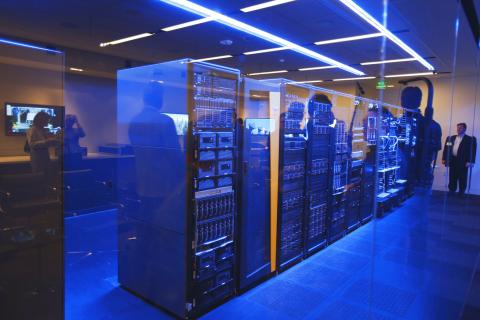Hewlett-Packard Co (HP), the world’s largest personal computer maker, is vowing to crack down on its Chinese suppliers in an effort to reduce the use of low-paid student interns and other temporary workers.
The guidelines unveiled on Friday are the latest attempt by a major US technology company to weed out labor abuses at Chinese factories that manufacture the gadgets for an Internet-connected world.
HP, which is based in Palo Alto, California, said its new standards are meant to ensure that its Chinese suppliers do not lean too heavily on student interns and temporary workers as a way to save money. The company says it wants to protect workers’ rights when they are hired.

Photo: Reuters
The new standards come a few months after Hon Hai Precision Industry Co (鴻海精密), a major Taiwanese manufacturer better known as Foxconn Technology Group (富士康科技集團), acknowledged that it has hired interns as young as 14.
Both HP and Apple Inc, the maker of iPhones, iPads and Mac computers, rely on Foxconn to make some of their products.
Apple, which is based in Cupertino, California, has also been trying to reform the labor practices at Foxconn and other Chinese suppliers in recent years in response to scathing criticism about the inhumane treatment of the workers making devices that have become status symbols, as well as multipurpose tools for communicating, reading, watching video and taking pictures.
Among other things, HP said it hopes its rules will prod its Chinese suppliers to employ mostly full-time workers instead of exploiting interns and temporary employees.
When interns and temps are used, HP said it will insist they are not forced to remain on the job against their will and have the right to file grievances. The company also pledged to ensure intern hours are kept well below the legal limit.
To show it is serious, HP intends to review the labor practices at its Chinese suppliers more frequently.
HP boasts an extensive supply chain that spans more than 45 countries and territories. The company’s stock gained US$0.41, or 2.5 percent, to US$16.85 in afternoon trading on Friday. The shares have traded in a 52-week range of US$11.35 to US$30.

Intel Corp chief executive officer Lip-Bu Tan (陳立武) is expected to meet with Taiwanese suppliers next month in conjunction with the opening of the Computex Taipei trade show, supply chain sources said on Monday. The visit, the first for Tan to Taiwan since assuming his new post last month, would be aimed at enhancing Intel’s ties with suppliers in Taiwan as he attempts to help turn around the struggling US chipmaker, the sources said. Tan is to hold a banquet to celebrate Intel’s 40-year presence in Taiwan before Computex opens on May 20 and invite dozens of Taiwanese suppliers to exchange views

Application-specific integrated circuit designer Faraday Technology Corp (智原) yesterday said that although revenue this quarter would decline 30 percent from last quarter, it retained its full-year forecast of revenue growth of 100 percent. The company attributed the quarterly drop to a slowdown in customers’ production of chips using Faraday’s advanced packaging technology. The company is still confident about its revenue growth this year, given its strong “design-win” — or the projects it won to help customers design their chips, Faraday president Steve Wang (王國雍) told an online earnings conference. “The design-win this year is better than we expected. We believe we will win

Chizuko Kimura has become the first female sushi chef in the world to win a Michelin star, fulfilling a promise she made to her dying husband to continue his legacy. The 54-year-old Japanese chef regained the Michelin star her late husband, Shunei Kimura, won three years ago for their Sushi Shunei restaurant in Paris. For Shunei Kimura, the star was a dream come true. However, the joy was short-lived. He died from cancer just three months later in June 2022. He was 65. The following year, the restaurant in the heart of Montmartre lost its star rating. Chizuko Kimura insisted that the new star is still down

While China’s leaders use their economic and political might to fight US President Donald Trump’s trade war “to the end,” its army of social media soldiers are embarking on a more humorous campaign online. Trump’s tariff blitz has seen Washington and Beijing impose eye-watering duties on imports from the other, fanning a standoff between the economic superpowers that has sparked global recession fears and sent markets into a tailspin. Trump says his policy is a response to years of being “ripped off” by other countries and aims to bring manufacturing to the US, forcing companies to employ US workers. However, China’s online warriors